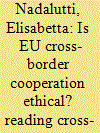| Srl | Item |
| 1 |
ID:
097140


|
|
|
| 2 |
ID:
105958


|
|
|
|
|
| Publication |
2011.
|
| Summary/Abstract |
The Irish border (between Northern Ireland - the 'North' and the Republic of Ireland - the 'South') has been described as a 'natural' cultural divide between the island's two dominant indigenous ethno-national communities. However, an examination of key resources of ethno-national group culture - religion, sport and language - provides evidence to challenge this representation. Moreover, in the post-1994 period of conflict transformation, evidence is also presented to support the proposition that the Irish border region has developed into a cultural space in which Irish nationalist and Ulster unionist ethno-national communities can explore cultural differences and commonalities through cross-border, cross-community contact and communication in small group encounters. This space underpins the reconfiguration of the border from barrier to political bridge between North and South. European Union (EU) Peace programmes for Ireland, beginning in 1995, provided the support for a cross-border approach to escaping the cage of ethno-national conflict in Northern Ireland. However, post-2004 EU enlargement signalled the beginning of the end for EU Peace funding, and severe economic recession has undermined the expectation of British-Irish intergovernmental intervention to support cross-border partnerships and their work. Therefore, the outlook for the sustainability of this cross-border cultural space is gloomy, with potentially deleterious consequences for the continued reconfiguration of the border from barrier to bridge.
|
|
|
|
|
|
|
|
|
|
|
|
|
|
|
|
| 3 |
ID:
126994


|
|
|
|
|
| Publication |
2013.
|
| Summary/Abstract |
Mainstream post-positivist approaches to Border Studies typically represent national borders as losing their importance or blurring. This insight usually fails to grasp the perspective of those who have to cross 'hard' borders, for whom these borders are primarily 'hard facts' quite precisely restricting territorial limits of their movement. Aiming to take this perspective and practical problems experienced by such border crossers into account, the author proposes an approach focusing on communication between those who cross 'hard' borders and those who protect these borders. The case of the EU-Russian border shows that border crossers have an increasing range of options to make themselves heard by their own country's officials, though it is much more difficult for them to reach gatekeepers and public on the other side of the border without resorting to intermediaries (such as their states or business actors). The author suggests that border crossers could be heard better if cross-border cooperation initiatives would prioritise this purpose thus making the EU's external borders not only 'friendly' or 'blurred' but also 'dialogic'.
|
|
|
|
|
|
|
|
|
|
|
|
|
|
|
|
| 4 |
ID:
140884


|
|
|
|
|
| Summary/Abstract |
This article applies Simone Weil’s philosophical concept of ‘uprootedness’ and the ‘14 needs of the soul’, set out in her 1943 book ‘The Need for Roots’, to the empirical case study of the border ‘Italy-Slovenia’ considered within Programme 2007–2013. A multi-dimensional qualitative approach that relies on an extensive literature, consultation of primary sources and semi-structured interviews carried out between October 2013 and February 2014 has been adopted.The article questions why does cross-border-cooperation often fail to develop an ‘integrated’ border territory and a cohesive ‘moral’ community? Conversely, why does social fragmentation emerge from cross-border-cooperation? It is argued that while the EU (Commission) has focused on initiatives and projects in order to achieve regional, economic border integration, it has instead failed to develop an ‘ethical framework’ for promoting a ‘rooted’ integrated borderland and a cohesive moral community.
|
|
|
|
|
|
|
|
|
|
|
|
|
|
|
|